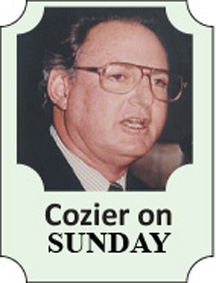By Tony Cozier
NOTHING is as it seems in West Indies cricket.
Of late, the gap has widened between the public statements of Dave Cameron, the executive president of the West Indies Cricket Board (WICB), and his chief executive officer, Michael Muirhead, and reality.

The public, even directors of the WICB, have been left in the dark on major issues. They need to be told the truth by those who lead the administration of the regional game.
Two issues now occupy Cameron’s attention. One continues to concern the WICB’s relationships with the Board of Control for Cricket in India (BCCI) over the withdrawal of the team from its scheduled tour of India 13 months ago.
The suspension of head coach Phil Simmons on the eve of the current tour of Sri Lanka for his comments over selection, more specifically the continuing exclusion of Dwayne Bravo and Keiron Pollard from the ODI squad, is the other.
Two weeks ago, Cameron revealed exclusively to The Nation newspaper of Barbados, by telephone from Mumbai, that he and Muirhead held ‘cordial and fruitful discussions’ for nearly two hours with BCCI president Shashank Manohar and Secretary Anurag Thakur at the BCCI’s offices.
Inevitably, the subject was the fallout from what the BCCI described at the time as the ‘unilateral cancellation of the tour by the WICB’ last October.
According to The Nation’s report, Cameron ‘confirmed’ that India would ‘almost certainly’ tour the Caribbean in 2016 for four Tests. They would return in 2017 for five ODIs since ‘split tours are likely to be more beneficial financially to the board than a single full tour’.
This was such a potentially vital breakthrough in the prolonged impasse between the two boards that official confirmation was surely required from both. None was forthcoming. Without it, no media outlet, in the Caribbean or India, followed up on the report.
In the meantime, the ICC Future Tours Programme (FTC) was suddenly adjusted to show that India would, indeed, tour the Caribbean for four Tests in July-August 2016 and five ODIs the following July, just as Cameron said they would.
Previously, it had listed India for three Tests, five ODIs and One T20 in February-March 2016, a series that was scuppered after the BCCI’s working committee decided to suspend all bilateral relations between the two until the US$42 million compensation was settled. It still hasn’t been.
The FTP’s alteration appeared to lend credibility to Cameron’s prediction; in fact, it added to the confusion after the Trinidad Guardian reported that the BCCI was not scheduled to deal with the impasse until its annual general meeting on November 9.
The Nation quoted ‘a source close to the board’, stating it was still hoping to negotiate a deal with the BCCI to have its compensation claim from 2015 settled. The proposal was for the West Indies to return to India for the cancelled matches as part payment.
Without Indian Premier League (IPL) superstars such as Chris Gayle, Bravo and Pollard and a few more, allied to the team’s No.8 position on the ICC rankings, it is hardly a profitable alternative. As it is, Cricket Sri Lanka estimates it will take a loss of around $4.5 million on the on-going West Indies tour of two Tests, five ODIs and two T20s.
According to an upbeat update from Muirhead last June, discussions with the BCCI on the issue ‘have been going very well’. He looked forward ‘to have a resolution finalised and documented’ after informal meetings between the two during the ICC’s annual conference in Barbados later in the month. Instead, BCCI secretary Thakur said there had been no progress.
Undeterred, Muirhead told Sportsmax TV, based in Jamaica, in August that the BCCI had ‘assured’ the WICB that it would not have to pay its claim for compensation. There has been no verification from the BCCI.
The question was obvious. Was Muirhead’s confidence for real or just wishful thinking?
The Simmons’ case is equally baffling.
The WICB’s management suspended him on September 28, two days after his critical, controversial comments.
‘Integrity and professionalism are high on our agenda and we will not compromise on that,’ Muirhead said in a rare, official statement the following day.
He was adamant that Simmons had not been fired but rather summoned to answer ‘breaches of confidentiality and bringing the game into disrepute’.
‘He will be given a fair hearing by a panel and a decision within the bounds of our own human resources policy,’ the CEO added. ‘The matter will be dealt with in a judicious manner and it is our intention to make a decision within the next seven working days.’
Over a month on and there has been no decision on Simmons’ future. Eldine Baptiste, one of the three selectors who voted against the return of Bravo and Pollard, remains as interim coach in Sri Lanka.
Last Thursday, without providing details, Muirhead verified rumours in the media that he would be reinstated. There had been dialogue with Simmons, he said, and ‘we’re moving to bring him back’.
The drawback was that Muirhead was waiting for Simmons’ call. His expectation was that it would be by the next day.
The case had taken a sudden U-turn. Initially censured, Simmons was now calling the shots and hearing that he would soon have his job back. There is no mystery in guessing as to Baptiste’s reaction.
With such a catalogue of confusion, it is little wonder that there is widespread mistrust of the leadership of the WICB from prime ministers, players and public.
Darren Sammy, one-time Test and ODI captain, summed it up in the somewhat different circumstances of heavy defeats in Tests in India and New Zealand two years ago.
‘We cannot continue like this,’ he said.




